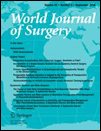The Impact of Financial Conflict of Interest on Surgical Research: An Observational Study of Published Manuscripts
Electronic supplementary material: The online version of this article (https://doi.org/10.1007/s00268-018-4532-y) contains supplementary material, which is available to authorized users.
Abstract
Background
Substantial discrepancies exist between industry-reported and self-reported conflicts of interest (COI). Although authors with relevant, self-reported financial COI are more likely to write studies favorable to industry sponsors, it is unknown whether undisclosed COI have the same effect. We hypothesized that surgeons who fail to disclose COI are more likely to publish findings that are favorable to industry than surgeons with no COI.
Methods
PubMed was searched for articles in multiple surgical specialties. Financial COI reported by surgeons and industry were compared. COI were considered to be relevant if they were associated with the product(s) mentioned by an article. Primary outcome was favorability, which was defined as an impression favorable to the product(s) discussed by an article and was determined by 3 independent, blinded clinicians for each article. Primary analysis compared incomplete self-disclosure to no COI. Ordered logistic multivariable regression modeling was used to assess factors associated with favorability.
Results
Overall, 337 articles were reviewed. There was a high rate of discordance in the reporting of COI (70.3%). When surgeons failed to disclose COI, their conclusions were significantly more likely to favor industry than surgeons without COI (RR 1.2, 95% CI 1.1–1.4, p < 0.001). On multivariable analysis, any COI (regardless of relevance, disclosure, or monetary amount) were significantly associated with favorability.
Conclusions
Any financial COI (disclosed or undisclosed, relevant or not relevant) significantly influence whether studies report findings favorable to industry. More attention must be paid to improving research design, maximizing transparency in medical research, and insisting that surgeons disclose all COI, regardless of perceived relevance.




